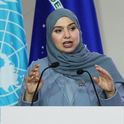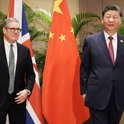As world leaders gathered in New York for the 79th session of the UN General Assembly, few would have had Resolution 2758 uppermost in their minds: most attention was focused on the continuing horrors of the Middle East and Ukraine. But for the 23m people of Taiwan, the resolution, which passed in October 1971 and excludes their official participation in any UN activity, is a continuing source of frustration.
Resolution 2758 was proposed by Albania—at the time a close friend of Beijing—and moved “to expel forthwith the representatives of Chiang Kai-shek from the place which they unlawfully occupy at the United Nations and in all the organisations related to it”. It gave China’s seat at the UN, until then held by Chiang Kai-shek’s Republic of China, to Mao Zedong’s People’s Republic of China (PRC), which was formed after the Communist Party won the 1949 Chinese Civil War.
At a stroke, Chiang, who had retreated to Taiwan in 1949, lost his government’s UN membership and its permanent membership of the Security Council. Chiang’s representatives walked out of the chamber and Taiwan has been excluded from many international organisations ever since. More than 50 years on, China continues to invoke Resolution 2758 to justify Taiwan’s exile: the island is part of China, Beijing maintains, and since there is “only one China” Taiwan cannot be represented.
Some civil society organisations are committed to restoring Taiwan’s representation. In the spacious backroom of a church in Taipei earlier in September, leading members of Taiwan’s United Nations Alliance, which campaigns for the island’s inclusion, were preparing to repeat what has become something of an annual ritual: writing letters to the UN secretary general António Guterres and UN members and observers—148 letters in all—requesting that the discussion of Taiwan’s UN status be opened once more.
This year, Lin Yet-min, the chair of the association, explained they were asking for a review of Resolution 2758. They say it did not in fact mandate Taiwan’s exclusion, as it makes no mention of Taiwan—only of Chiang. They also fiercely reject Beijing’s claim that Taiwan has always been part of China: the island had a long history as a Dutch and later a Japanese colony, along with many centuries of apparent indifference to its existence from China’s emperors.
The group’s previous letters were ignored. So too was the appeal of the former Taiwanese president, Tsai Ing-wen, for Taiwan to be admitted to the World Health Assembly—the decision-making body within the World Health Organization (WHO)—as an observer. In May last year, the diplomatic representatives in Taiwan of the UK, the United States, Australia, France, Japan, Lithuania, Canada, Czechia and Germany supported Taiwan’s admission. Still, under Chinese pressure the application was rejected.
That rejection was particularly galling, since the group believes that Taiwan has much to offer the UN and its associated bodies, and the WHO in particular. After the Sars epidemic in 2003, which hit Taiwan hard, the US and Japan supported observer status for Taiwan. In 2005, however, the WHO secretariat negotiated a secret memorandum of understanding with Beijing that set rules for contact with Taiwan. Unknown to Taipei, the rules stated that contact between Taiwan and the WHO, other than in an acute emergency, would have to be pre-approved by the WHO secretariat and the Chinese health ministry. The agreement also set out cumbersome procedures to impede Taiwan’s participation in technical meetings.
One result, according to the government in Taipei, was that when Taiwan tried to alert the WHO to the outbreak of a new form of pneumonia in the central Chinese city of Wuhan as early as 31st December 2019, the warning was ignored. Taiwan immediately put screening in place and banned visitors from Wuhan, while Beijing continued to suppress the news for a further month. “If we have been listened to then, the world might have been spared the worst of the pandemic,” says Lin Yet-min.
At the September meeting in the church, there was a keen sense of frustration about Taiwan’s permanent diplomatic relegation, which many here argue was a result of political rivalries on mainland China being imported to Taiwan against the wishes of the Taiwanese. Even Taiwan’s official name, the Republic of China, is misleading: it was China’s name when the country was under Kuomintang (KMT) rule from 1928 to 1949—but for most of that period, Taiwan was a Japanese colony. Only with the defeat of Japan in 1945, and despite the objections of the Taiwanese people, was Taiwan handed to Chiang’s China—which itself ceased to exist four years later, when Mao declared the creation of the PRC.
The sad reality is that in 1971 parallel representation for both the PRC and the Republic of China would have been possible—and was frequently proposed. There were, after all, two Germanys, each with a UN seat. Today, both North and South Korea have representation. The two Germanys reunited after 1989 and both Koreas pay lip service to the idea of one country, even if neither is exactly rushing in that direction.
China objected to parallel representation, but in 1971 it could have been obliged to accept a compromise. Beijing was less powerful, and was in a long and bitter dispute with the USSR. Preparations were already underway for Richard Nixon’s historic 1972 visit to Beijing. Progress on this point was hindered, though, because Chiang shared Beijing’s view that there was only one China: he simply disagreed about who was its rightful ruler, maintaining the fiction that one day he would reconquer the mainland. He, too, rejected the idea of a separate seat.
Taiwan’s government has tried, since then, to appeal for inclusion either as a full member or to participate in UN activities in less defined ways. In 2007, with the centre-left Democratic Progressive Party in government, Taiwan applied for full UN membership under the name Taiwan. The bid was rejected by the then secretary general Ban Ki-moon on the grounds that “[i]n accordance with [General Assembly Resolution 2758], the United Nations considers Taiwan for all purposes to be an integral part of the People’s Republic of China”.
The United States protested. Other governments—but not all—took note of China’s claim, but did not, necessarily, endorse it.
Today, the chances of changing Taiwan’s relationship with the UN, as the members of the United Nations Alliance wish, are slender at best. Even getting the topic onto the agenda is unlikely as long as China is a veto-wielding permanent member of the UN Security Council and remains determined to recover an island that it defines as a renegade province.
So what opportunities are there for Taiwan to gain international representation?
There has been some support recently for a rethink of the UN’s blanket exclusion. In August, Australia’s senate rejected China’s interpretation of Resolution 2758, which it said neither prohibits Taiwan’s participation in international organisations, nor affirms China’s sovereignty over Taiwan. On 12th September, the Dutch house of representatives also passed a resolution stating that Resolution 2758 does not involve Taiwan—the first parliamentary body in Europe to do so.
Despite these encouragements, and however just their argument, Yet-min’s group know that they are unlikely to secure representation at the UN. Any move in that direction would be interpreted in Beijing as a step towards de jure independence. Under international law, however, granting Taiwan observer status or finding pragmatic ways to cooperate in UN agencies such as the International Civil Aviation Organization and the International Maritime Organization would not change Taiwan’s formal status but could plausibly give it a greater voice in international affairs. As a Taiwan government spokesman put it recently, “We are an independent sovereign country. There is no need to claim.”











